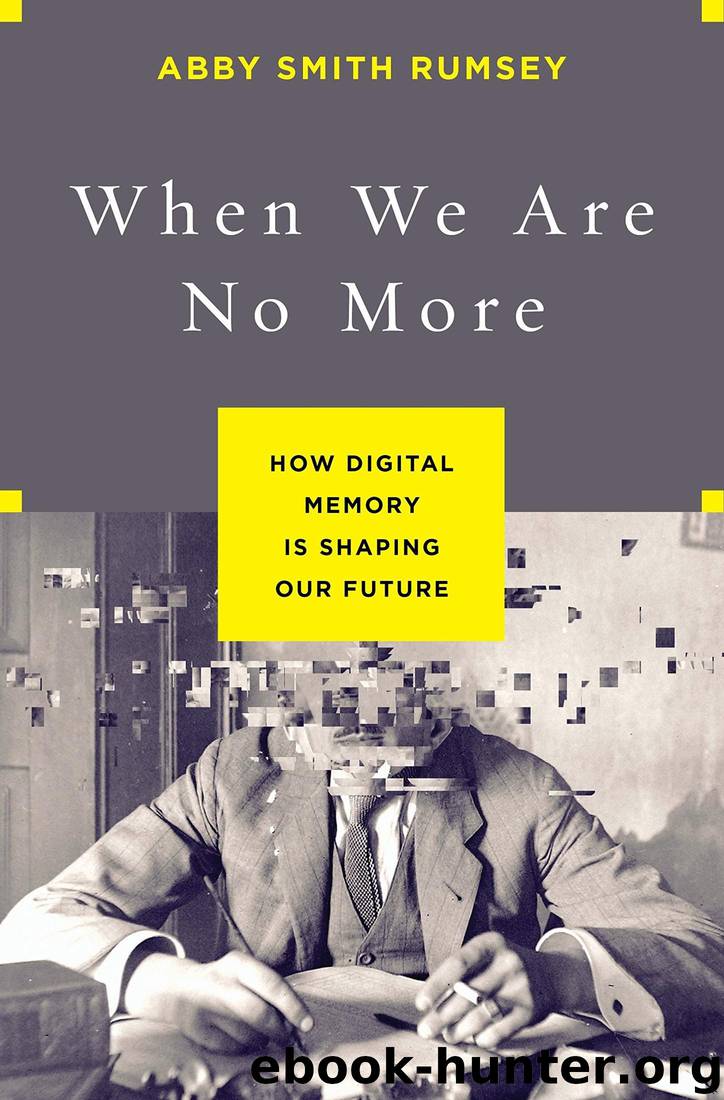When We Are No More: How Digital Memory Is Shaping Our Future by Abby Smith Rumsey

Author:Abby Smith Rumsey
Language: eng
Format: mobi
Tags: Language Arts & Disciplines, Life Sciences, Library & Information Science, Science, Computers, General, Neuroscience, Information Technology, History
ISBN: 9781620408032
Publisher: Bloomsbury Press
Published: 2016-03-01T05:00:00+00:00
DISTRACTION: THE STORY OF S.
A man whose brain was far too elastic for his own good was the Russian known to us as S. His story is told with compassion and discretion by the psychologist Aleksandr Romanovich Luria in The Mind of a Mnemonist: A Little Book about a Vast Memory. (Luria refers to this man simply as S., and we shall observe his discretion.) Luria studied his subject over the first three decades after the Russian Revolution. S.’s problem was that he did not have what Luria calls “the art of forgetting,” a faculty of the healthy mind that creates order from excess by converting selected short-term memories into long-term memories and flushing away the rest. Long-term memories in turn align themselves into distinct patterns as they are abstracted into general categories and reused over time. S. remembered a prodigious amount of detailed information that never lost its vividness, but at the high price of never abstracting perceptions into greater patterns of significance.
As a consequence, S. suffered from a disorder of distraction: He could not make things dull, and had a hard time maintaining focus on anything for extended periods. He was unable to sort his impressions for value and emotional salience. To him the world was far too vivid far too much of the time. Luria reports his patient could remember everything but was unable to establish priorities for his memories. As a consequence, his speech was digressive and prolix. He would start out on one subject and end up somewhere very far away, often down a blind alley. He easily confused what he had remembered (because everything he encountered in his daily life triggered a chain of recollections) with what had actually transpired. Memories were so fresh in affect and spun out in his mind so rapidly that he mistook his recollections for reality. There were periods in his youth when he did not get up in the morning to go to school because even thinking about arising stimulated memories of having done so before. He thought that he had gone to school even as he lay still under the covers. After some period of time, S.’s inability to distinguish between what he had recollected and what had actually transpired led to a blurred sense of reality, an attenuated sense of actually being alive.
The proximate cause of his overarticulated memory was likely his synesthesia, an enigmatic neurological phenomenon whereby stimulation of one sense or perception provokes another unrelated one. When he recalled the word for beetle, zhuk, for example, he immediately thought of “a dented piece in the potty, a piece of rye bread,” and the entire sensation of turning the light on in the evening and having only a part of the room—the zhuk—in light. Once he thought of these, he could not let go of them. On the one hand, it was easy for S. to establish a series of associations that would prompt recall. He was able to make a living as a mnemonist,
Download
This site does not store any files on its server. We only index and link to content provided by other sites. Please contact the content providers to delete copyright contents if any and email us, we'll remove relevant links or contents immediately.
Learning SQL by Alan Beaulieu(6288)
Weapons of Math Destruction by Cathy O'Neil(6279)
Digital Minimalism by Cal Newport;(5764)
iGen by Jean M. Twenge(5414)
Sapiens by Yuval Noah Harari(5369)
The Age of Surveillance Capitalism by Shoshana Zuboff(4291)
Elon Musk by Ashlee Vance(4127)
Thing Explainer by Randall Munroe(3938)
Apollo 8 by Jeffrey Kluger(3707)
Future Crimes by Marc Goodman(3597)
The Science Book (Big Ideas Simply Explained) by DK(3286)
The Innovators: How a Group of Hackers, Geniuses, and Geeks Created the Digital Revolution by Walter Isaacson(3206)
Who Can You Trust? by Rachel Botsman(3133)
I Live in the Future & Here's How It Works by Nick Bilton(2997)
Infinite Energy Technologies by Finley Eversole(2983)
Steve Jobs by Walter Isaacson(2899)
Dawn of the New Everything by Jaron Lanier(2770)
Chernobyl by Serhii Plokhy(2538)
Ben Franklin's Almanac by Candace Fleming(2530)
